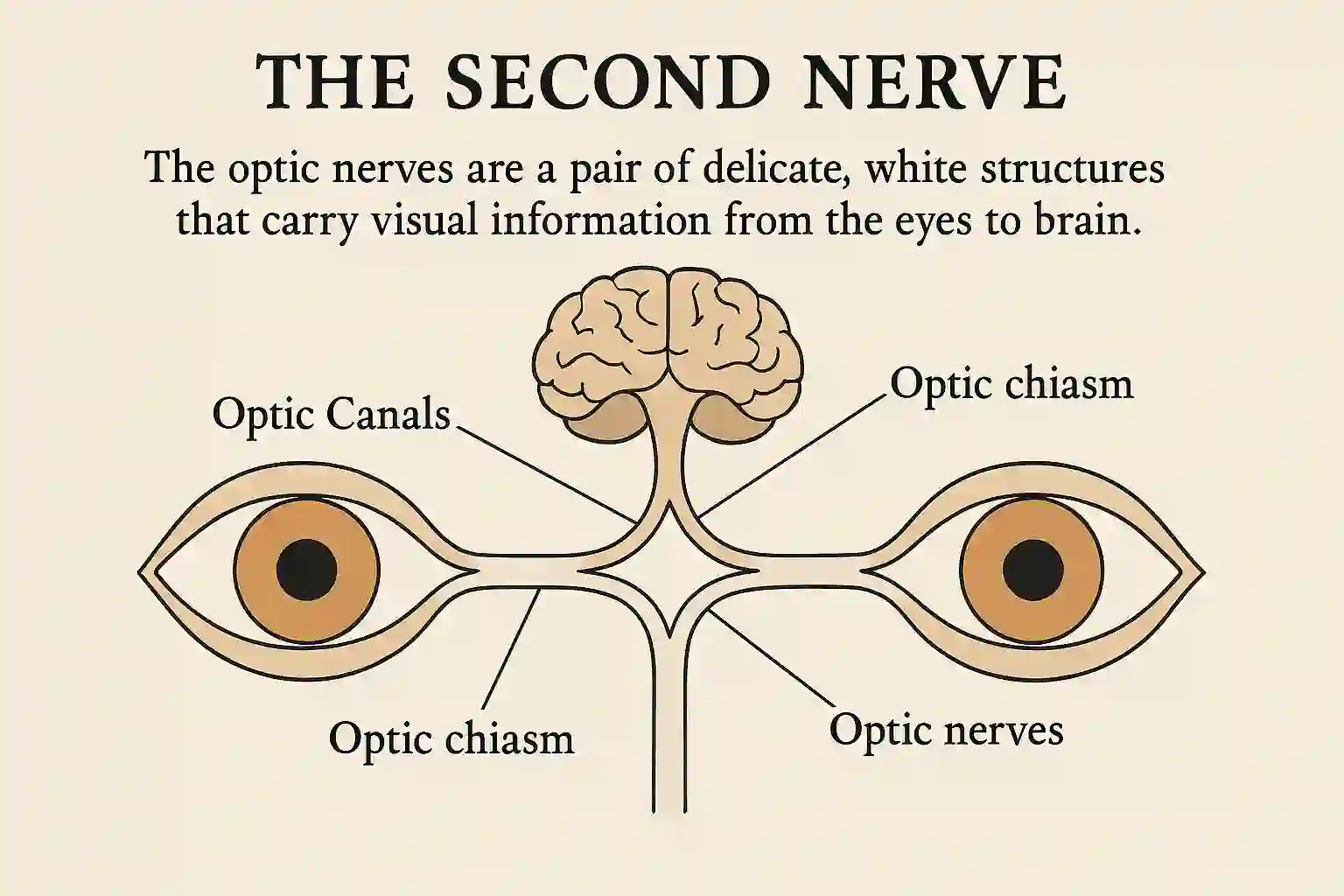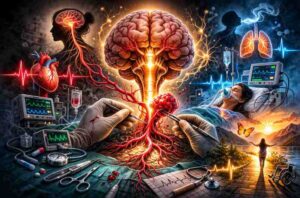The second among the 12 pairs of cranial nerves is the optic nerve. Mary sat across the table from me in my office in a flowery dress with a print of bougainvillea on it. A matching hairband completed the outfit. “I have been unable to see clearly for the past few weeks,” she told me, continuing with a slightly more detailed description of her diminution in vision. “It’s mostly on the sides – I’m bumping into chairs in the house, and when I cross the road, I can’t see cars until they’re really close. I’m afraid this might escalate into something serious,” she said, justifying her concern. She was a teacher who was failing to call on kids at the extreme corners of her classroom. I would have loved to be in that class, I thought to myself.
Her astute ophthalmologist had confirmed that as there was no issue with her eyes, it was probably the optic nerves that were the problem and had ordered an MRI. Optic nerve issues can often be misdiagnosed by ophthalmologists when presented with a patient who has a bit of a cataract; the real issue comes to light when they find that vision doesn’t improve after eye surgery. The MRI expectedly showed a tumour arising from the pituitary gland and pressing against the optic nerves. Those nerves, usually sleek white highways of vision, now resembled two elevated white lines on a speed breaker.
“The optic nerves are a pair of delicate, white structures that carry visual information from the eyes to the brain,” I explained. “They emerge from the back of each eye, passing through small openings in the skull called the optic canals. These nerves then converge at a point called the optic chiasm, where some of the nerve fibres from each eye cross over to the opposite side of the brain. This crossing ensures that both sides of the brain receive visual information from both eyes, which is crucial for depth perception and binocular vision. And because this crossing is being pushed up by the tumour, the view on either side of your visual field is compromised,” I explained. “Too technical?” I asked. She nodded. I drew a diagram. She understood. “Surgery is the only option to remove it and relieve pressure from the nerves. It’s flattening the speed breaker from below the road, and for that, we’ll have to go through your nose,” I said, pointing a finger at mine to demonstrate what I meant.
A few days later, we entered her cavernous nostrils, navigating all the bumps along the way to drill the saucer-shaped piece of bone on which the pituitary gland rests. As we cut into tumour, it oozed out like cream cheese from a pastry. We meticulously inspected the cavity for any remnant of tumour, scraping the edges of the pastry as well. The optic nerve could be seen in the distance separated by a flapping spider web-like layer, relaxing peacefully.
“This is nothing short of magic!” she told me after surgery, once her vision was restored to normal. “She even saw Jesus for a few minutes,” the husband joked with me, when I went for my evening rounds. “We have opened up her third eye also,” I kidded, “so you’d better be extra careful now!”
Could it be that ancient eyes, unburdened by our modern lens, perceived a deeper harmony between the microcosm of our nervous system and the macrocosm of the spiritual world?
Perhaps the very act of seeing, through the lens of the optic nerve, was once understood as a glimpse into the realm of enlightenment. Mary was delighted that her vision was back. The students sitting in the corners of her classroom weren’t.





10 thoughts on “The Second Nerve”
As an ophthalmologist practising since 40 years , have watched many a patient recovering excellent vision due to neurosurgery provided the eye surgeon made a timely diagnosis of a pituitary problem . Kudos to you Mazda for raising awareness of this issue !
The scariest surgeries seem to b a child’s play in the ryt hands! Ur r first n final decision always !
Dr. Mazda you are great. Perfect diagnosis at right time.
Magical ,how precision surgery can do wonders !
Eagerly waiting for the other nerves ,not getting on anyone’s .
Magical ,how precision surgery can do wonders !
Eagerly waiting for the other nerves without getting on anyone’s .
Dearest Dr Mazda sir ……..
You have explained the second nerve so nicely that we common people who are non medical also start learning the complexities of brain & nerve systems inside the brain
Timely diagnosis can improve & restore back the normal vision by neurosurgeon is very interesting information
Keep on entertaining your readers with variety of subjects with your witty write up sir 🌹
Dear Dr. Mazda,
Your diagnosis was spot-on, and your simple explanation of the optic nerve compression made a complex issue understandable. The minimally invasive surgery you performed effectively relieved the pressure, restoring Mary’s vision. Her joy at regaining her sight, and the playful banter with her husband, highlights the profound impact of your skill and care. God Bless You Doc !!!
We would like to express our sincere thanks and appreciation to Dr. Mazd for the valuable and useful information he shared with us. The information provided was rich and fruitful, and we appreciate his efforts in clarifying and simplifying it.
The information presented by Dr. Mazd contributed to expanding our understanding of important topics, and we particularly appreciate his ability to present information in a clear and concise manner, which made it easier for us to comprehend. His skill in simplifying complex concepts and making them accessible to everyone is a quality worthy of praise.
We thank Dr. Mazd for dedicating his time and expertise to share this valuable information with us, and we appreciate his dedication and sincerity in serving his community through the dissemination of knowledge. His commitment to providing accurate and reliable information is an inspiration to us all.
We pray that God blesses Dr. Mazd’s efforts, and rewards him with the best for what he has provided. We wish him continued success in his professional career, and that he continues to provide his valuable information that contributes to enriching our community.
Excellent work Mazda. You can make something so frightful and serious look like a simple challenge. If you weren’t such a brilliant neurosurgeon, you would have done equally well as a writer.
Suggest you devote some spare time in penning your experiences, it would instill a lot of hope and confidence in people.
Very interesting and knowledgeable writing doctor. Keep curing ur patients and b blessed.